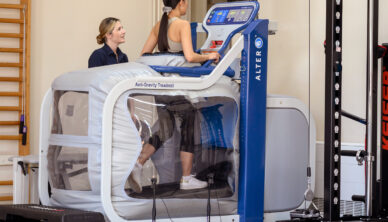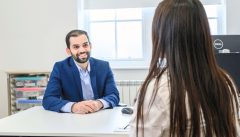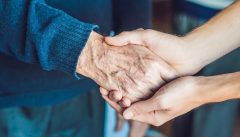Contents
From Limited Mobility to Independence: Case Study

From Limited Mobility to Independence: A Stroke Rehabilitation Case Study The Royal Buckinghamshire Hospital
Recovering from a stroke can be a daunting journey, but with the right rehabilitation, remarkable progress is possible.
At The Royal Buckinghamshire Hospital, we specialise in helping stroke survivors regain strength, confidence, and independence.
Find out how our committed team helped a patient progress from requiring walking assistance to walking independently.
The Challenge
When our patient was first admitted to The Royal Buckinghamshire Hospital, she faced mobility challenges due to stroke with left vertebral artery occlusion and dissection. Before starting her rehabilitation journey with us, she:
- She needed a tripod stick for walking and required assistance.
- Struggled with balance issues and right-side neglect, making movement difficult and unsafe.
- Had minimal strength and endurance in her right arm and leg.
- Could not climb stairs or walk independently outdoors.
- Was unable to venture into the community due to mobility limitations.
to regain her independence, she embarked on our intensive rehabilitation programme at The Royal Buckinghamshire Hospital.
A Tailored Rehabilitation Programme for Maximum Recovery
At The Royal Buckinghamshire Hospital, we believe that rehabilitation should be as unique as the individual. Our multidisciplinary team created a tailored plan to help her regain movement, strength, and confidence.
Her personalised programme, designed to address her rehabilitation needs, included various therapies to target her specific challenges:
Hydrotherapy for Balance & Strength
- Water-based exercises to enhance core stability and muscle endurance in a supportive environment
Physiotherapy for Strength & Coordination
- Used our state-of-the-art Anti-Gravity treadmill for balance, mobility, and endurance.
- Resistance bike training to boost leg strength and stability.
- Resistance training using weights, resistance bands, dumbbells, and boxing to rebuild muscle strength.
- Balance exercises through drumming, basketball, and outdoor park walks on uneven surfaces.
Occupational Therapy for Everyday Functionality
- Participated in ADL sessions in our fully equipped adaptable kitchen, baking cupcakes to improve fine motor skills and coordination.
Mobility Training for Independence
- Indoor walking practice progressing from using a stick to walking unaided
- Real-world mobility training by venturing into the local town with support.
The Personalised Rehabilitation Programme Results
By the end of her rehabilitation programme, our patient experienced an incredible transformation:
- Now walks unaided both indoors and outdoors.
- Increased walking speed and endurance.
- Can jog at a minimum speed — a feat she never thought possible.
- Navigates grass, hills, and uneven surfaces confidently.
- Feels more independent when crossing roads, shopping, and engaging in daily activities.
Why Choose The Royal Buckinghamshire Hospital for Stroke Rehabilitation?
At The Royal Buckinghamshire Hospital, we are dedicated to helping stroke survivors reclaim their lives.
Here’s why we stand out:
- Expert Multidisciplinary Team: Our team of physiotherapists, occupational therapists, and specialists work together for optimal recovery.
- Cutting-Edge Rehabilitation Technology: We use the latest advancements, including the AlterG Anti-Gravity treadmill, hydrotherapy, and resistance training equipment.
- Personalised Treatment Plans: No two patients are the same, and our customised approach ensures targeted recovery.
- Holistic Approach: We focus not just on mobility but also on confidence-building, functional skills, and real-world independence.
Start Your Rehabilitation Journey Today
If you or someone you care about is seeking a specialised stroke rehabilitation programme, The Royal Buckinghamshire Hospital is here to support you. Our personalised programmes empower stroke survivors to rebuild independence and confidence in daily life.
Contact us today to learn more about our rehabilitation services and success stories:
3 April 2025



